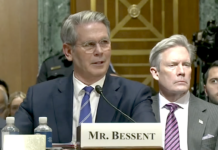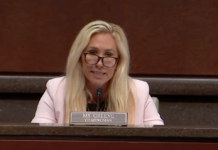
(GA Recorder) — A signature piece of the tough-on-crime agenda pushed by Gov. Brian Kemp and fellow top Republican lawmakers cleared a Senate committee on Monday after a debate over a bill that would make recruiting minors into gangs a criminal offense and add stiffer mandatory minimum sentences for all gang-related offenses.
Georgia’s Senate Judiciary Committee passed the street gang prevention act Senate Bill 44 with a 6-3 party-line vote. The bill now heads to the gatekeeping Senate Rules Committee that determines which legislation makes it to the chamber’s floor for a vote.
The bill calls for anyone 18 years of age or older who is convicted of a street gang offense to serve a mandatory minimum of five years and a minimum of ten years for recruiting minors to join a gang. People convicted under mandatory sentencing will serve the full length incarcerated without any chance of it being suspended or converted to probation.
The judge is given an opportunity in limited circumstances to reduce a sentence if the defendant provides significant assistance in identifying and convicting other gang members. Prosecutors would have the authority to appeal sentences they deem to be too lenient.
Kemp’s floor leader, Sen. Bo Hatchett (R-Cornelia) said that street gangs have been operating a youth movement where they recruit younger people to carry out the gang’s crimes since they are not as obvious a target for law enforcement officers and won’t face as harsh penalties as the adults.
“The governor’s office wants to send a strong message to gang members: You come after our children and endanger our communities, and we will come after you,” said Hatchett, a Cornelia Republican.
“I’m not always for mandatory minimums, but in this case, you’re talking about a group of individuals that are targeting children and trying to recruit them into a criminal enterprise and they’re taking away their innocence,” Hatchett said.
As street gang violence ratchets up around metro Atlanta, Republican leaders are concentrating their efforts on crime prevention in order to lower homicide rates and other violent crimes occurring in the capital’s business districts and other neighborhoods.
Republican lawmakers and local law enforcement agencies say that gangs are not just a problem in big cities but in mid-sized metro and rural areas of the state.
Around the metro Atlanta area in recent years, there have been violent clashes of large group gatherings in which law enforcement says gang leaders are getting minors to do their bidding.
The Senate panel heard opposition to the bill from civil rights advocates with the ACLU of Georgia and the Southern Center for Human Rights. They criticized the measure for taking away discretion from judges while also clogging up the court system with more jury trials.
With the state’s extensive list of crimes that could be considered RICO racketeering offenses, it means that white collar offenses such as mortgage fraud could fall under that umbrella.
Mazie Lynn Guertin, executive director of the Georgia Association of Criminal Defense Lawyers, said that longer prison sentences won’t deter criminals or help them reintegrate into society after completing their sentences.
Instead, Senate Bill 44 is likely to disproportionately harm teens and minors with slightly older siblings who might be associated with gangs.
She said the charge could lead to someone facing 40 years in prison if they have also been convicted of gang and RICO offenses.
Guertin said Georgia’s strides in criminal justice reform haven’t gone far enough, with statistics from September 2021 showing the state has the fourth-highest incarceration rate per capita in the world.
“Incarceration rates are not a rational response to high crime rates, but they are a politically expedient response to fear,” she said.
In 2020, the Georgia Bureau of Investigation handled more than 360 criminal cases with ties to street gangs who have become more emboldened, said GBI associate director John Melvin.
That’s only the tip of the iceberg as more gangs infiltrate more communities.
“We do know that the governor is not only interested in punishing those that are committing gang crimes but also shutting off the flow of gang members into that community,” Melvin said.
Athens Republican Sen. Bill Cowsert asked what other avenues beyond stiffening criminal penalties will send the right message when dealing with the proliferation of street gangs recruiting young people.
“What other tools do we have other than to get these people out there to stop doing it,” he said “I mean, we’ve tried that rehabilitation route; we’ve tried three strikes. We’ve tried to restructure our harshest penalties.”
Jack Winne, deputy chief assistant district attorney for the Coweta Judicial Circuit, said he believes that locking up gang members reduces violent crime.
“The reality is a lot of this is about incapacitation in the way these gangs indoctrinate and corrupt their members,” Winne said.”They have to be removed from the community in order to not victimize (other people).”
Sen. Harold Jones, an Augusta Democrat, said the state already has strong penalties for the offenses that would be covered under the bill.
The problem is that political leaders and others who have the power to change the dynamics aren’t willing to make the long-term investments to change a culture of gangs, he said.
“We know there’s core issues out there that cause somebody with mental health, poverty, whatever it is, but we say we can’t deal with those right now but ten years later, it’s the same problem,” Jones said.







